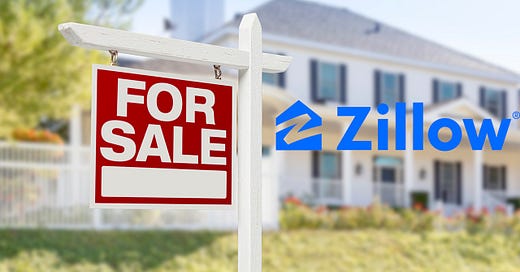“Zillow calls timeout on iBuying, but its competitors won’t”, says a recent headline.
Today, we’ll explain how Zillow messed up iBuying, and was forced to pause some of its business operations.
Let’s start from the beginning.
What is iBuying?
iBuyers buy your home by using algorithms and some basic diligence. iBuyers generally avoid distressed properties.
They make 12.5% - 17.5% revenue per home by reselling it quickly:
Charging you fees to sell your home (5%-10%)
Short-term home price appreciation (5%)
Ancillary services: title, mortgage, etc. (2.5% - planned)
However, because of the costs involved: 70% of their gross margins come from short-term home price appreciation.
Why do people sell their home to iBuyers?
Selling a home is an intense, tiring process that can take 3 - 12 months
iBuyers make it seamless, and buy your home in weeks.

Usually, iBuyers pay the market rate for your home, and sell it for ~5% more 2-3 months down the line.
So far, iBuyers have not turned a profit

Gross margins are positive. But net margins are negative because of massive capex.
Offerpad’s net margin is considerably better than that of Zillow and Opendoor. Mike DelPrete explains why:
Offerpad's latest financials strongly suggest that a less venture-funded, less tech-enabled, more real estate focused, and less breakneck version of iBuying can be (almost) profitable.
Who are the major players?
3 players have captured most of the market - Opendoor, Zillow, and Offerpad.
Zillow’s market share has consistently increased over the last 3 years.

Opendoor and Zillow use technology heavily, while Offerpad relies more on traditional real estate expertise.
How big is this market?
2019: Purchases by iBuyers accounted for 1% of total home purchases!
2020: Volume dropped by 50% due to staff shortages
2021: Massive rebound. Q3 2021 was the highest on record.

They’re only focused on a few markets
Major Markets: North Carolina, Arizona, Texas, and Georgia (Southern and Western US, mostly).
Why did Zillow screw it up?
Nationally, Zillow’s iBuyer purchases grew 4x from Q1 to Q3 this year.
70% of iBuyer margins come from home price appreciation, in an otherwise unprofitable model.
In September, home prices started to cool down in some cities.
Opendoor and Offerpad seem to have anticipated this, because they slowed down their activity as prices cooled.
Zillow did the opposite - they tried to keep growing.
In Pheonix, for example, Zillow bought more homes even as the others slowed down.

To make matters worse - Zillow bought the most expensive homes.

Seems like Zillow incorrectly predicted that their iBuying markets would see strong home price appreciation in Q4.
So, they had no option but to stop purchases for the rest of the year to avoid massive losses.
They said staffing shortages and prohibitive repair costs led to this decision. Now you know better!
However, they’ll probably be back in full force starting next year.
Shout out to Mike DelPrete for his amazing research in this space.
Featured Interview: Sam Sawyer on disrupting real estate brokerage
Sam Sawyer is a serial entrepreneur. He got his real estate license at 19, was one of the founding members of Compass Dallas, and was employee #1 at ZeroDown. Now, he runs the full-service cloud brokerage Archetape. Here’s what he told us in an exclusive chat.
Q. What does the future look like for the real estate brokerage industry?
I like to use the “building a house” analogy for where I see the future brokerage models going.
Companies like Archetape are rebuilding the entire home from the ground up with vastly different business model architecture than the legacy players. Our cloud-based model allows us to invest heavily into agent tools and resources which make our agents incredibly happy and empower them to make more money.
The legacy players remind me of homes that go through a remodel where only cosmetic items are updated; at their core, they are still an old-school outdated model behind the scenes, and eventually, they will fail without massive innovation at their foundation.
Read more about Sam’s perspectives and other real estate investors and entrepreneurs on home.llc/interviews.
If you liked this post, help us spread the word:
If you’d like to unsubscribe, here’s a quick way:





